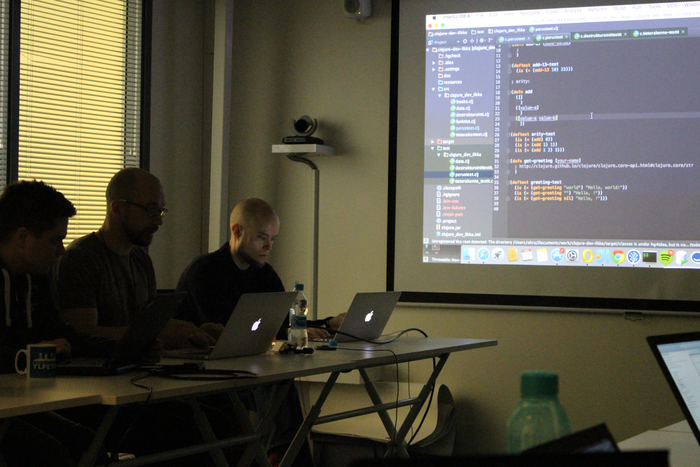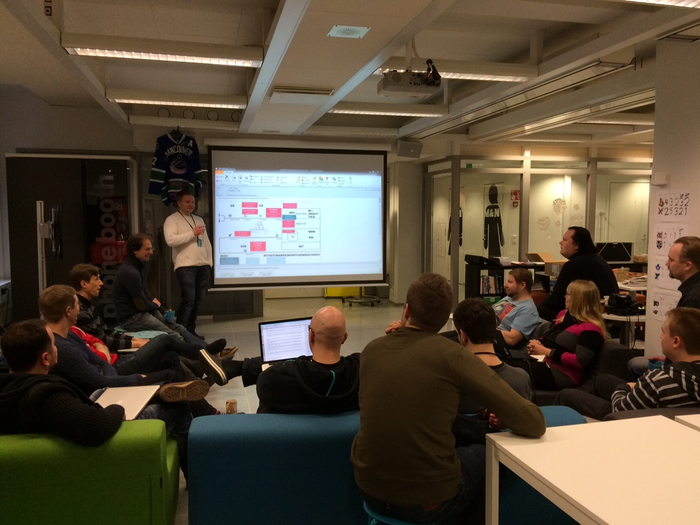Tl;dr: Our 300+ employees can cherry pick from and kick up educational sessions at work time, which seems to work well.
In a previous post, I mentioned that my employer has a policy of fostering educational sessions on company time. In this post I discuss the arrangement.

Solita is a Finnish 300+ employee company that specialises in services; tech consulting, design, code, analytics.
Here’s a listing of internal sessions given at one of our meeting rooms, from a span of three weeks this spring.
- Data visualisations with Clojurescript
- 50 new things in Java 8
- Git workshop (+)
- Solita IT starter pack
- Solita Science meetup (+)
- Solita company starter pack
- User centered design
- Product ownership
- Apache Cassandra, short facts (+)
- The case of point-to-point integrations
- Tips for accessibility
- Dynamic cubes
- Clojure basics (+)
- Powershell
- Lean UX
I’ve marked the ones I attended to with a + sign. They were employee powered short talks or technical hands-ons.
In addition to internal educational session, we have some other educational assets in place. There is a personally reserved amount of time for self studies, for watching educational videos, Coursera and so on, and thirdly, we get external education and consulting in situations which require it.
This is somewhat different from my earlier employers, and I confess that it agrees well with my personal interests (which are largely those of a developer). Andrew Hunt and David Thomas list the following principles for managing your professional knowledge portfolio:
Invest regularly.
Diversify.
Manage Risk (balance conservative and high-risk, high-reward investments!).
Buy low, sell high (consider early investment in emerging technologies).
Review and balance (keep it up to date).
These are slightly abbreviated for clarity, but the Hunt & Thomas book is solid; read it.
##Learning on company time
Firstly, then, you could say that my employer is somewhat closer to a collective than a traditional company is. And due to this culture of relative individualism, also more likely to invest freely in its employees than an average company is. This bias could be fed by the branch of business, the services market requiring a wide range of competencies to compete in it.
From a more humane point of view, my employer has chosen to trust its employees and let them choose. An employee then is expected to learn topics that will benefit their skills development and work competence.

What then are the downsides of education (if one may ask that)?
First and foremost, learning is an immediate investment for an employer, and its results vary, being somewhat hard to measure. Learning is a double cost, because an employee both loses the opportunity to do work and is then paid for that (I’m stating this bluntly, but this is how it basically goes). Now an easy solution would be to regard professional knowledge as the employee’s private property, and channel company money to other ends. This is the common solution.
A more modern solution is to invest in a company culture that will attract talented employees. In such a culture, the positive consequences of sharing can be estimated higher than the opportunity cost that goes with it. This gives a borderline between personal and shared that is different to the traditional solution, with totally new pros and cons.
I find that learning at Solita resembles the structure of the internet to some extent. There is no central plan for what goes where, only some evolving protocols and boundary rules which enable this system keep rolling.
These practices are partly a community effort, partly developed by our current and ex coordinators of trainings. Timo Lehtonen (Tampere), Patrik Marjanen (Helsinki), and Anna Rautiainen (ex-coordinator) deserve a mention here, first and foremost. Cheers and thank you!
##More discussion

I think it takes some trouble, case by case, to argue how learning this or that would benefit somebody. And as the general case goes, it seems totally impossible to give anything more than generalisations like “learning is good”.
Now looping back to Hunt’s & Thomas’ Diversify principle, it may benefit me personally in the long run if I learn something quite unrelated to my current tasks, cutting down the risks of my other investments. But then again productivity in my current main responsibilities may often feel more desirable. In my personal experience, a choice between interesting new topics and established topics is very hard. It can feel a little selfish to look at something interesting if I could be doing concrete and useful work with that time.
But then again my professional competence and problem solving skills will benefit from an occasional break.
To counteract excessive educational temptations, as they would appear, we have company wide open access to all work records (excluding legislated personal information). I can freely compare my work to that of other individuals or teams in the company. In addition, there are some alarm systems in place that inform about my current ratio of customer work vs. my non-billable work.
Preparing an educational session for others then is settled from a separate cost pool, so it need not consume my personal study hours. It shows up in my organisational unit’s costs, though.
In this way Solita aims for a level of coincidence of the separate interests of employee, employer and customer.

##Conclusion
My nights have been full of thrills lately. Both of our youngest, my four year old son with his toddler sister, got sick – yielding a nightly vomit per an hour or so. This has been going on for the last 48 hours. Now you might think that ninja berries refers to those strange orange–white clumps commonly found in that product, whatever!
Going through these personal headaches, it is super great that I can do my own prioritisation at work time, especially on a zombie day like this when logical thinking seems a no–can–do, write a post or take some less important and lower priorised tasks. I’m not into learning today, being as tired as I am.
This relative freedom of decision was trumpeted in the past by Agile, Scrum, and other production methodologies. Their common premise is to avoid micromanagement and let the “resource” itself decide its next step. (Let’s provide the cage, management said…) This same idea, of individual choice within a target driven environment, is transported to the realm of learning here, and it seems to be working fairly well at Solita, from what I can judge.
Here are some symptoms:
- an increasing number of professionals kick up short educational meetings and bulletins
- there is a positive feeling about sharing and communication in the company
- meetings end up with discussion and questions, leading to short problem solving discussions at best
- there is cross department interaction, which is nice
A big thank you to Juuso, Kati, Jonne, and Ari for reading this post through and giving invaluable suggestions!